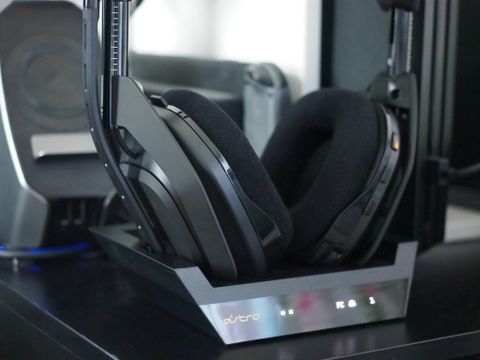Back in 2019, the Astro A50 got a bit of a soft revamp. An improved docking station, superior headset design, and boosted audio were all on the docket. I reviewed the headset back in 2019, and have reviewed dozens upon dozens of competing products since, many of which appear in our best Xbox One headset and best Xbox Series X, Series S headsets roundups.
Despite all the competing options I have available to me, time and time again, I find the convenience of the Astro A50 unbeatable, despite the $300 price tag. If you're someone who does a lot of gaming across multiple platforms at your desk in a single space, this headset is kind of unbeatable.
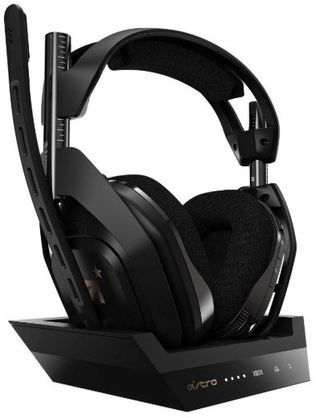
$300Bottom line: The Astro A50 isn't cheap, but after several years, it remains my primary headset for work and play. This is the only wireless headset on the market that ticks every box for my specific needs, without compromising with bad Bluetooth and annoying charge cables.
For
- Incredible audio
- Comfortable and lightweight
- Convenient, weighted base station
- Versatile audio mixing
- Great mic quality
- Superior app experience
Against
- Adjustability mechanism isn't great
- Fuzzy fabric cups can get warm, and leatherette cups are sold separately for $50
Astro A50: Availability and price
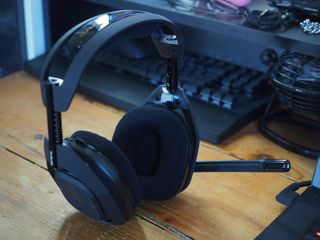
The Astro A50 has a pretty beefy price tag coming in at $300. Despite the bulky price, I feel like it's worth every penny. Being able to seamlessly and wirelessly mix a SPDIF optical source (like your TV) and a USB source (like your PC) is absolutely invaluable as someone who does a lot of gaming across different devices from the same desk space. It's no slouch in the audio department either, with a solid sound profile and a convenient recharge dock to boot. It's available at most major retailers, although supplies can be intermittent.
Astro A50: Why I love this headset
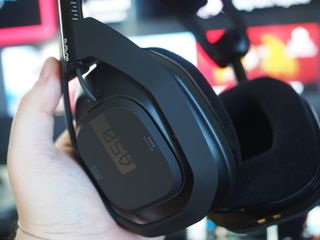
The Astro A50 dropped the gaudy neon-green accents of its predecessor to go for something a little more subtle, a little more stealth which fits in with wider design trends for gaming accessories as of late. Out are the toy-like designs of the past, which is a welcome change, frankly. The metallic accents on the new design look great, and crucially, add to the headset's sturdiness.
| Category | Spec |
|---|---|
| Frequency response | 20Hz to 20,000Hz |
| Speakers | 40mm Neodymium |
| Weight (headset) | 380g |
| Weight (base station) | 317g |
| Size (base station) | 8.5 x 4.25 x 1.15 inches |
| Features | Flip-to-mute mic, side-tone voice monitoring, EQ presets |
| Battery life | 15 hours |
| Compatibility | Xbox, PC and PS4, PC variants |
| Price | $300 |
The base station for charging also received a design upgrade. It's heavier, with a smaller footprint. The weight is good to prevent cable tautness from moving it around, which is particularly useful if you're planning to use the optical SPDIF in combination with the USB cable. You can daisy chain the base stations too for lag-free communications in esports settings, which is why you often see these products at events. The switch on the back lets you seamlessly move between PC and Xbox-oriented drivers, with a frontal display that shows Dolby Atmos activation, battery life, EQ modes, and the current platform mode.
The magnetized base makes it easy to dock and charge your Astro A50 headset, which lists around 15 hours of battery life with a range of 30 feet for wireless connectivity. The signal is rock solid, and suffered zero interference despite sharing a small space with tons of other wireless devices. This reliability is one core reason why I always come back to this headset, year in, year out. Bluetooth sound mixing just isn't reliable enough for how much I switch between Xbox and PC.
Moving past the aesthetics, the design of the headset has had a few improvements here and there. The adjustable side frames have been softened on the ends to make them easier to manipulate, and the buttons feel a little more tactile and responsive than the previous set. Pressing on the headset's outer cup lets you adjust the mix between the SPDIF audio and the USB audio, and there's a dial in the corner for adjusting the master volume. There's also a very robust PC and Xbox app that gives you even more control over sidetone, EQ settings, and beyond. Honestly, every aspect of the Astro A50 just screams quality.
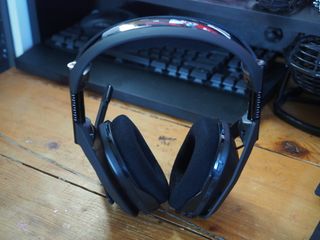
The A50 has gotten better and better in the audio department too with subsequent firmware updates. The headset's 40mm drivers deliver virtual surround sound incredibly well, even if the soundstage isn't as broad as some of its competitors. The soundscape is balanced, though, offering crisp detailing without sacrificing powerful bass notes and warmer tones.
Honestly, every aspect of the Astro A50 just screams quality.
The A50 is generally performant for music and media, offering lush cinematic qualities that really pulls you into the show, or make you feel like you're deep in the pit at a rock concert. EQ presets can help you navigate different sound profiles at a whim, but I found the Astro signature setting to be adequate for general use.
The microphone isn't content creation-grade, but it is very good, and detailed and clear enough for problem-free comms. The flip-to-mute mic is also a nice convenience.
All-in-all, there's very little to complain about with this product. The audio is excellent and is highly configurable, the design upgrades are a welcome improvement, and the wireless base station provides unprecedented freedom and convenience. We're very close to perfection here, but there are always a few things that could be done better.
Astro A50: What I don't love
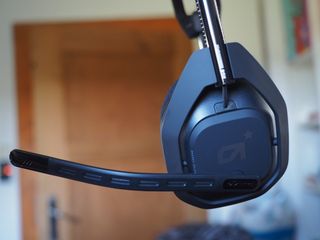
Astro seems to really enjoy its unique headband clasp adjustability, for lack of a better descriptor, but I really think it holds the product back. I've overlooked it previously, but when everything else is screaming quality, it's just a bit odd how difficult Astro makes it to adjust their headsets. You really have to push and force the poles against the plastic clasps to get them to move up and down, which isn't something you really have to deal with in any other headset I've tested.
I'm also not a huge fan of the woolly fabric Astro uses on its headsets. I find it to be overly warm, and considering we're still in summer, it's very much like wearing winter earmuffs. Astro sells a separate A50 mod kit with leatherette earcups which are no doubt cooler on the skin, but you're already paying $300 for the privilege of this product. They should be included, in my opinion.
Previously, I found that the Dolby implementation on this headset introduced an odd echo-y quality into the sound mix, but I think that has been subsequently fixed with firmware updates. There's honestly nothing too major to complain about here.
Astro A50: The competition

The Astro A50 doesn't really have any competition for its features. There are no options out there right now that let you mix SPDIF optical audio from your TV in combination with a USB PC source, making the A50 the most ideal solution for those who use their PCs in tandem with their Xbox or PlayStation consoles.
There are headsets out there that potentially have better value, if you don't need to mix sound from a SPDIF optical source. I would recommend the Corsair HS75 XB as a go-to option for those who just want a pure wireless no-nonsense Xbox headset. The cheaper RIG 700 PRO HX is also a great, more affordable option. If you find Bluetooth to be reliable, you could also consider something like the LucidSound LS50X. But if you want something with a charging base, this is your only option.
Should you buy the Astro A50?
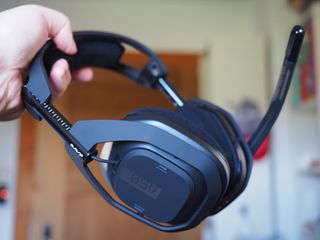
Despite the fact that this headset is a whopping $300, it's quite easily the best all-round wireless headset you can get for Xbox One and PC today. The charging dock convenience, solid wireless signal, and excellent audio when combined have few rivals in the space.
You should buy this if ...
- You want to mix Xbox and PC sound simultaneously using SPDIF and USB.
- You want the convenience of a charging base station and wirelessness.
- You don't mind paying a bit more for quality.
You shouldn't buy this if ...
- You don't need the dual sound source mixing.
- You don't think the charge dock is value for money.
If you don't need the dual-sound mixing feature or the charge dock, you will potentially find a lot better value with a more affordable headset. But honestly, there's a reason I keep coming back to the Astro A50 as my primary day-to-day headset, despite having tested dozens upon dozens of competitors. The convenience really is worth it in my particular setup.

Near-perfect
The Astro A50 is widely respected as the best Xbox and PC headset money can buy. Superior convenience, mature app ecosystem, dual-sound mixing, and one of the few remaining SPDIF optical options on the market — this headset is killer for prosumers and heavy gamers alike.

Jez Corden is a Managing Editor at Windows Central, focusing primarily on all things Xbox and gaming. Jez is known for breaking exclusive news and analysis as relates to the Microsoft ecosystem while being powered by tea. Follow on Twitter @JezCorden and listen to his XB2 Podcast, all about, you guessed it, Xbox!
